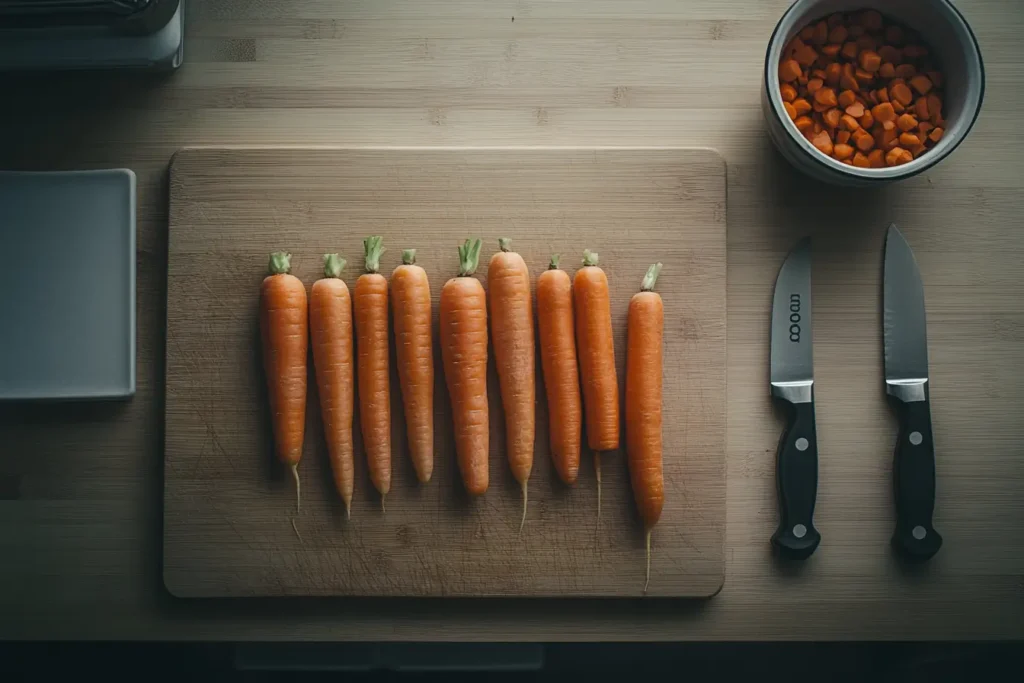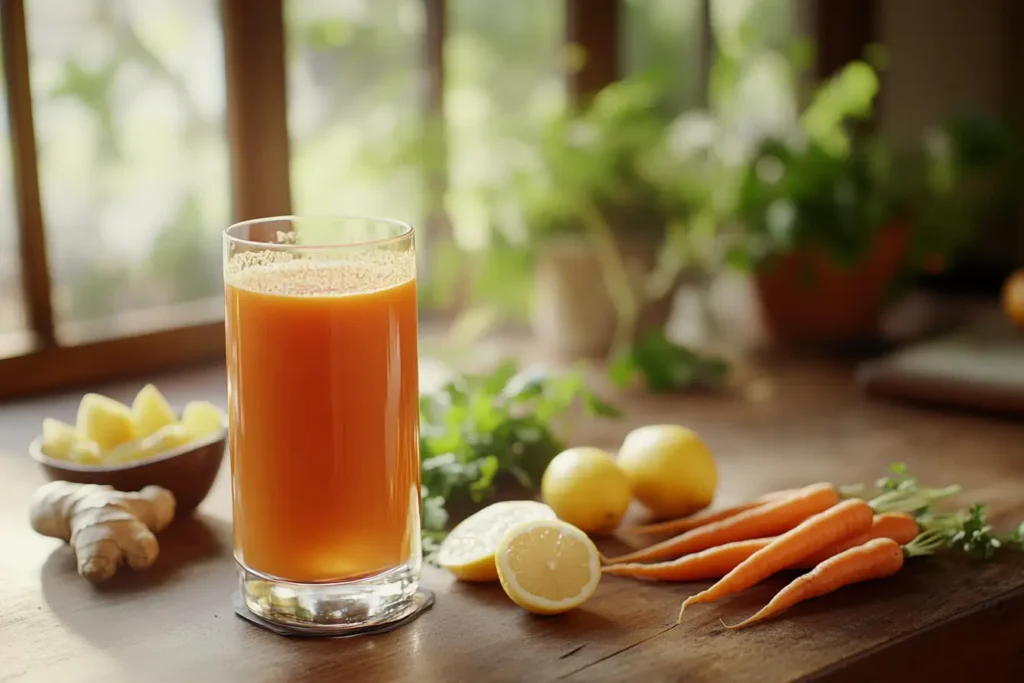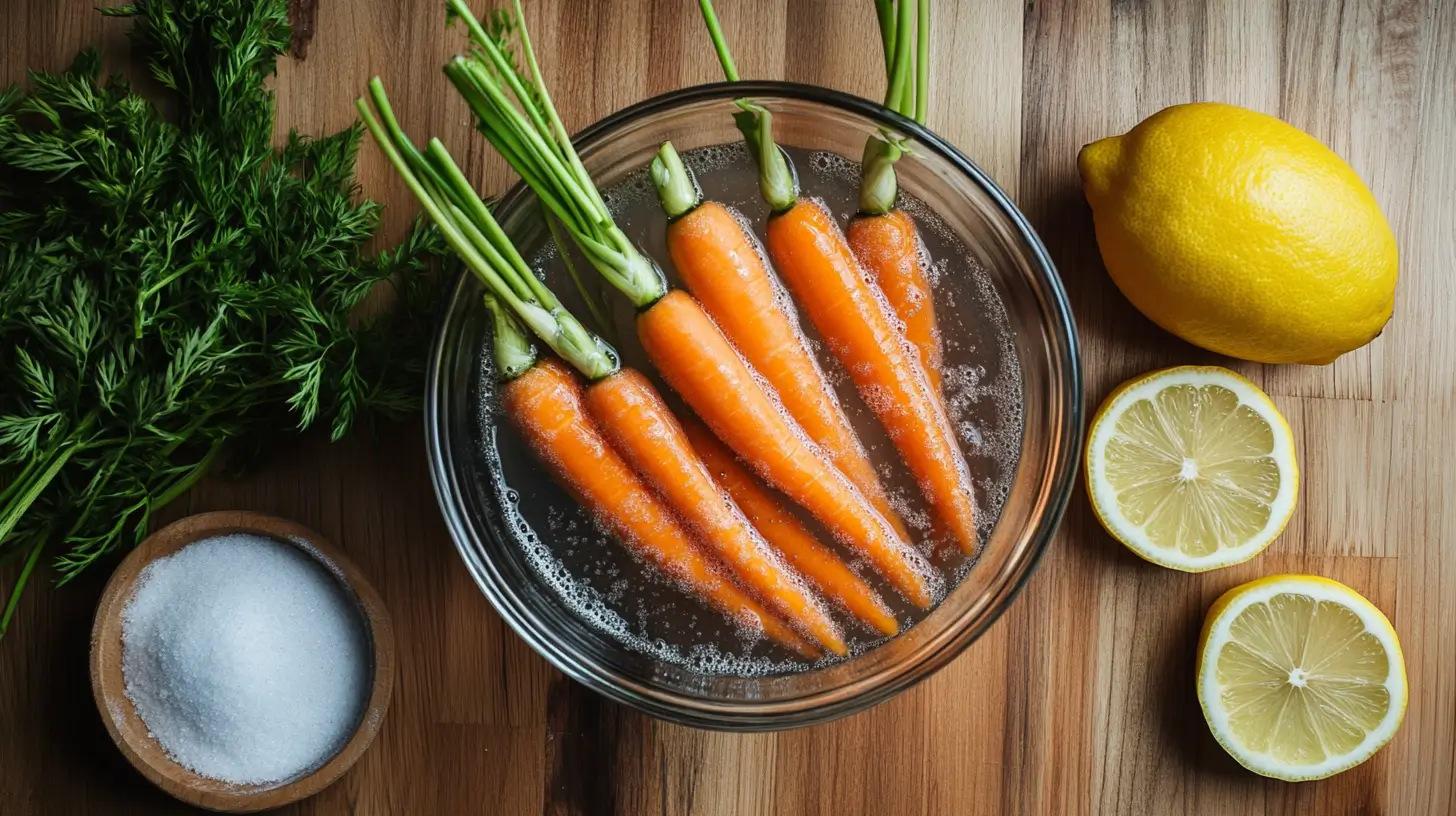Introduction
Should you soak carrots in water before juicing? It’s a question many juicing enthusiasts and home cooks often ponder. Carrot juice is one of the most popular beverages for its sweet taste, nutritional value, and ease of preparation. However, the way you prepare carrots before juicing can greatly affect the quality of your juice.
Soaking carrots might seem like an unnecessary step, but it can be a game-changer when it comes to cleanliness, taste, and overall juicing experience. This guide will walk you through the reasons for soaking carrots, the best methods to do it, and alternatives for those short on time. Whether you’re juicing for health benefits, flavor, or just to try something new, understanding this simple step will help you create the perfect glass of juice.
Table of Contents
Why Soak Carrots Before Juicing?
Should you soak carrots in water before juicing? The answer lies in the many benefits soaking offers. Soaking carrots helps remove dirt, pesticides, and other residues that can affect the quality of your juice. When you soak carrots in water before juicing, you also enhance their natural sweetness and ensure they’re clean and safe for consumption.
Removes Dirt and Pesticides
Carrots, especially non-organic ones, often come coated with dirt, pesticides, and other residues. Skipping this step can leave unwanted particles in your juice, which not only affects the taste but also your health. By soaking carrots in water, you help loosen these impurities and make them easier to wash away. Adding a bit of vinegar or baking soda to the soaking water can enhance the cleaning process, especially for carrots grown with chemical pesticides.
Enhances Juicing Quality and Flavor
When you soak carrots in water, you’re essentially allowing them to regain some of their natural moisture. This can make them juicier and result in a smoother, more flavorful drink. Residual dirt or pesticides that haven’t been cleaned properly can leave a bitter aftertaste in your juice. Soaking ensures your juice retains the natural sweetness and freshness of the carrots.
Nutritional Retention
There’s a common misconception that soaking carrots causes them to lose nutrients. However, this isn’t the case. The water simply cleans the surface of the carrots without affecting their nutritional value. This means you can enjoy all the vitamins, antioxidants, and minerals that carrots have to offer without compromise.
For more tips on preparing vegetables for juicing, check out our Ultimate Guide to Carrot Juice Recipe.
Traditional Practices
In many cultures, soaking vegetables like carrots is a routine part of food preparation. This age-old practice ensures the produce is clean, fresh, and free of harmful contaminants. It’s a simple but effective way to get the best out of your carrots before juicing them.
Wondering about the health benefits of carrot juice? Learn more about What Is Homemade Carrot Juice Good For?.
Steps for Soaking Carrots in Water Before Juicing
If you’ve ever wondered “Should you soak carrots in water before juicing?”, the process is simpler than you might think. Start by rinsing the carrots under running water, scrubbing them to remove surface dirt. Then, soak them in cold water for 10–15 minutes to loosen any stubborn grime. Following this method ensures your carrots are ready for the juicer and guarantees better-tasting juice.

Step1: Select Fresh Carrots
The first step is choosing the right carrots. Always opt for firm, brightly colored carrots without any cracks or soft spots. Organic carrots are a better choice as they have fewer pesticides, but soaking is still recommended to ensure maximum cleanliness.
Step2: Scrub and Wash
Before soaking, rinse your carrots under cold running water. Use a vegetable brush to scrub off any visible dirt. This preliminary cleaning ensures that soaking is more effective.
Step3: Soak in Water
Fill a large bowl with cold water and submerge your carrots completely. Let them soak for 10–15 minutes. This time allows dirt and any remaining residue to loosen. For added cleaning power, you can:
- Add one tablespoon of vinegar to the water.
- Sprinkle half a teaspoon of baking soda into the soaking water.
Step4: Rinse and Dry
After soaking, rinse the carrots thoroughly under running water to remove any lingering dirt or cleaning agents. Pat them dry with a clean kitchen towel to prevent excess water from diluting your juice.
Alternatives to Soaking Carrots Before Juicing
While soaking is ideal, some people ask, “What if I don’t have time?” If you can’t soak carrots in water before juicing, consider alternatives like dry scrubbing or peeling. However, skipping the soak may not remove all contaminants, which is why experts recommend soaking carrots for juicing when possible.

How to Properly Clean and Prepare Carrots for Juicing
Using a stiff vegetable brush, scrub your carrots thoroughly under running water. This method removes dirt without the need for soaking and is ideal for those short on time.
Peeling
Peeling carrots is another effective way to remove dirt and pesticides. However, this method removes the outer layer of the carrot, which contains many nutrients. It’s a trade-off between cleanliness and nutritional value.
Quick Rinsing
If your carrots look relatively clean, a quick rinse under running water can suffice. While it’s not as thorough as soaking, it’s better than skipping the cleaning process entirely.
Looking to balance your carrot juice with other ingredients? Explore ideas in What Fruits Pair with Carrots?.
Do You Always Need to Soak Carrots in Water Before Juicing?
The question “Should you soak carrots in water before juicing?” often depends on the type of carrots you’re using. Organic or pre-washed carrots might not require soaking, but store-bought carrots or those with visible dirt benefit significantly from this step.
When Soaking Carrots for Juicing is Necessary
Soaking is particularly important for non-organic carrots, which are more likely to have pesticide residues. It’s also essential if your carrots are visibly dirty or have been stored for a long time.
Can You Skip Soaking for Organic or Pre-Washed Carrots?
If you’re using homegrown carrots or pre-washed organic ones, soaking may not be necessary. However, giving them a quick rinse or scrub is still a good practice to ensure cleanliness.
Want to know how much carrot juice is safe to drink daily? Read How Much Carrot Juice Should I Drink a Day?.
Common Myths About Soaking Carrots for Juicing
There are plenty of myths surrounding the practice of soaking carrots before juicing. Let’s debunk a few of the most common ones.
Does Soaking Carrots Cause Nutrient Loss?
This myth is far from the truth. Soaking carrots in water doesn’t strip them of their nutrients. The nutrients are locked inside the carrot and won’t dissolve in water during a short soak.
Is Soaking Carrots Before Juicing Time-Consuming?
While soaking adds a few extra minutes to your preparation, it significantly improves the cleanliness and flavor of your juice. Think of it as a small investment for a big reward.
“Soaking Isn’t Necessary for Organic Carrots”
Even organic carrots can benefit from soaking, as they might still carry dirt or bacteria.
Nutritional Tips for Juicing Carrots After Soaking
To get the most out of your carrots, follow these tips for juicing and maximizing nutrition.

How Soaking Helps Retain Nutrients in Carrot Juice
Combine carrots with complementary ingredients like ginger, apples, or lemon for added flavor and health benefits. Using a slow juicer can help preserve the vitamins and antioxidants in carrots by preventing overheating during the juicing process.
Storage Tips
Always store your carrots in a cool, dry place before soaking them. After juicing, consume your carrot juice immediately to retain its nutritional value and freshness.
Retain Nutrients
Avoid over-soaking carrots, as it can make them too waterlogged and affect the juice’s texture. Stick to the recommended soaking time of 10–15 minutes for the best results.
Wrapping Up: Enjoy Your Delicious Creation
Should you soak carrots in water before juicing? The answer lies in the benefits. Soaking carrots not only removes dirt and pesticides but also enhances the flavor and cleanliness of your juice. It’s a simple yet effective step that ensures you’re getting the most out of your carrots.
If you’re short on time, alternatives like dry scrubbing or peeling can still get the job done. However, for the freshest and cleanest juice, soaking is your best bet. Whether you’re making a classic carrot juice or experimenting with carrot and ginger combinations, this preparation step can make all the difference.
Now, it’s your turn to try. Soak your carrots, juice them up, and enjoy a refreshing, nutrient-packed drink. You’ll love the difference a little preparation can make in your morning routine.
Frequently Asked Questions (FAQs)
What Are the Benefits of Soaking Carrots in Water?
Soaking carrots in water offers several advantages, especially when preparing them for juicing:
Removes Dirt and Pesticides: Soaking loosens dirt and helps wash away pesticide residues, making your juice cleaner and safer.
Enhances Flavor: Removing contaminants improves the natural sweetness of the carrots, resulting in better-tasting juice.
Rehydrates and Freshens Carrots: If carrots are slightly dehydrated, soaking them restores their moisture, making them juicier.
Improves Hygiene: Soaking is an extra step in ensuring cleanliness, especially for store-bought carrots.
Do I Need to Soak Carrots in Water?
Whether or not you need to soak carrots depends on your preferences and the type of carrots you’re using:
Yes, Soak Them If: You’re using non-organic carrots or those that appear dirty or dusty. This ensures they’re free from harmful residues.
No, You Can Skip If: You have organic or pre-washed carrots. A quick rinse or scrub may suffice in these cases.
While soaking isn’t always necessary, it’s a small step that guarantees better hygiene and flavor for your juice.
Are Soft Carrots OK to Juice?
Soft carrots can still be juiced as long as they’re not slimy, moldy, or foul-smelling. Slight softness is often due to dehydration, which soaking in water for 15–30 minutes can help fix. However, if carrots are too mushy or rotten, discard them as they won’t produce quality juice and could pose health risks.
Is It Better to Drink Carrot Juice or Eat Carrots?
Both drinking carrot juice and eating whole carrots have their unique benefits:
Drinking Carrot Juice: Provides a concentrated dose of nutrients, including vitamin A and antioxidants, in an easily digestible form. It’s a great option for those looking to quickly absorb vitamins.
Eating Carrots: Retains fiber, which is important for digestion, heart health, and maintaining fullness. Whole carrots are a better choice if you’re looking to manage weight or improve gut health.
The best option depends on your dietary goals. Ideally, incorporate both into your routine for a balanced approach to nutrition.

